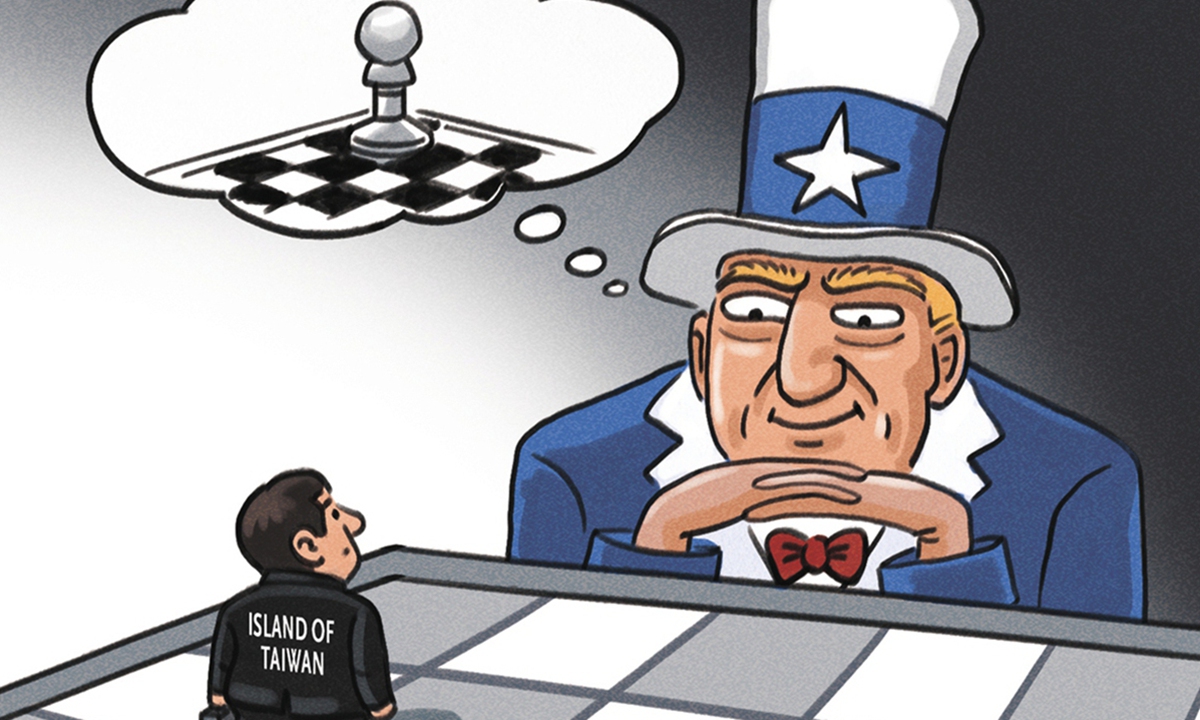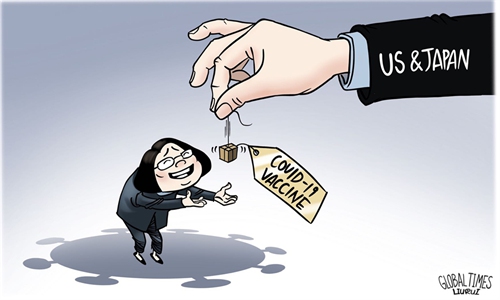
Illustration: Liu Rui/GT
The US has repeatedly tested China's strategic bottom line on the Taiwan question recently.On June 27, Michael D. Swaine, director of the US think tank Quincy Institute's East Asia program, and Marcus Stanley, advocacy director of the institute, published an article on Business Insider regarding the US Senate's the Strategic Competition Act, which recently passed as part of US Innovation and Competition Act of 2021, saying the bill "asserts a vital US interest in keeping Taiwan separate from China."
What they said is true, Washington is reluctant to see the reunification between the Chinese mainland and the Taiwan island. The US views China as its top rival. Washington believes after reunification, Beijing will inevitably pose a bigger challenge to US' global hegemony. And this is not conductive to maintain US' global strategic interests.
Raymond Greene, former deputy head of the American Institute in Taiwan (AIT), who has departed AIT earlier this month after his three-year tenure, said in Taipei on June 24 that the US no longer sees Taiwan as a problem in its relations with China. It is instead an opportunity to promote a free and open Indo-Pacific, according to Reuters. Greene's remarks have triggered wide attention from the international community. His words indicate that he sees the island as an "independent country," instead of an inalienable part of Chinese territory. This has severely violated the one-China principle.
Sometimes, American diplomats make remarks in a whim - it may not represent the stance of the White House. But it can at least represent the mind-set of some Americans. Such a dangerous mentality deserves China's strong vigilance.
The US is increasingly overtly exploiting Taiwan as a tool to contain China. When former US secretary of state Henry Kissinger paid a secret trip to China five decades ago, the Taiwan question was the toughest issue for China and the US to negotiate. Although former US president Richard Nixon visited China in 1972, the diplomatic relations were established as late as 1979. Apart from certain political issues, China and the US could not achieve a consensus over the Taiwan question - this was the most important factor obstructing China and the US from establishing diplomatic ties immediately after Nixon's visit. Even though half a century has passed, the Taiwan question in China-US relations has remained its significance. It is the most important and sensitive issue in China-US relations. The US acceptance of Taiwan as a part of China is the bedrock of China-US relations, not a card to play.
Today, China has a completely new look with its national strength, which is far more powerful than in the past. On the one hand, the US believes that a rising China is challenging its hegemony, so it is becoming nervous. On the other hand, the US's comprehensive strength is declining. The country is stuck in its severe domestic puzzles, including the widening gap between the rich and the poor, and racism. These factors have intensified US' anxiety toward China, leading many in the country to exaggerate China's threats and challenges.
Therefore, the Taiwan question is used by the US as a pawn. Unfortunately, the ruling Democratic Progressive Party authorities on the island are seeking Taiwan secessionism and willing to become a piece of US chess.
In recent years, the US has ramped up its attempts to boost its ties with Taiwan with more official interactions. For example, the US State Department in April issued new guidelines to enable US officials to meet more freely with "officials" from Taiwan. And three US senators arrived in Taiwan by a military transport aircraft rather than a civilian plane on June 6. These gravely challenged China's red line and were evident provocations against China.
In the face of US' repeated provocations, China should take stronger and more powerful countermeasures. The US tricks are intended to test where China's red line is. If China's counterattacks are soft, the US will take more steps forward by "salami tactics."
China should promptly, powerfully and effectively respond to the actions of the US in challenging China's red line. Beijing has to send a clear signal to Washington and establish an effective deterrence. Only by doing so can the US understand the risks in repeating such pattern and become prudent in playing the Taiwan card.
The author is a deputy director and senior fellow of the Institute of American Studies, Chinese Academy of Social Sciences. opinion@globaltimes.com.cn



